Hand-eye coordination, also known as eye-hand coordination, is an important perceptual-motor skill children develop during the early years.
It is the ability to perform movements with the hands while being guided by the eyes. A child’s hands and sight work together to perform tasks.
Here are some hand-eye coordination examples in daily life:
- A baby grasping an object
- Batting the ball in a game of cricket
- Tying your shoelaces
- Writing a sentence
- Brushing your hair
- Making a cup of tea
Not only do we need hand-eye coordination to perform everyday tasks, it is also important for playing sports and learning to read and write at school.
Reading and writing require well-developed visual tracking skills.
Your brain needs to track the position of the pencil and control the hand and finger movements. When reading, your brain is visually tracking as you move from left to right and down to the next line. [source]
Here are some and effective eye-hand coordination activities and games that will exercise the brain’s ability to coordinate the hands and eyes simultaneously.
1. Throwing and Catching a Ball
Ball activities are probably the best way to develop children’s eye-hand coordination.
You should practise catching and throwing balls often as this is also a skill that will be needed when your children begin playing sports. Alternate throwing with bouncing a ball to each other.
Use different-sized balls such as tennis balls, basketballs, beach balls, etc. Throwing and catching smaller balls requires more advanced skills.
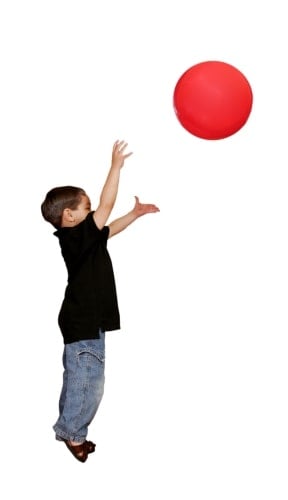
2. Having a Pillow Fight
This is one the kids will love! Throw pillows at each other and work the eyes, hands and laughs at the same time.
3. Threading and Lacing
Threading and lacing are great for developing concentration as well as practising controlled movements. Kids have to coordinate their eyes and fingers carefully in order to do this task.
Make your own lacing cards by using cardboard shapes and punching holes into them.
Thread beads onto string or use macaroni and make a necklace.
Threading and lacing are two of the best activities you can do to build fine motor skills.
4. Working in the Garden
Gardening is a good way to get outdoors while developing coordination and general gross motor skills.
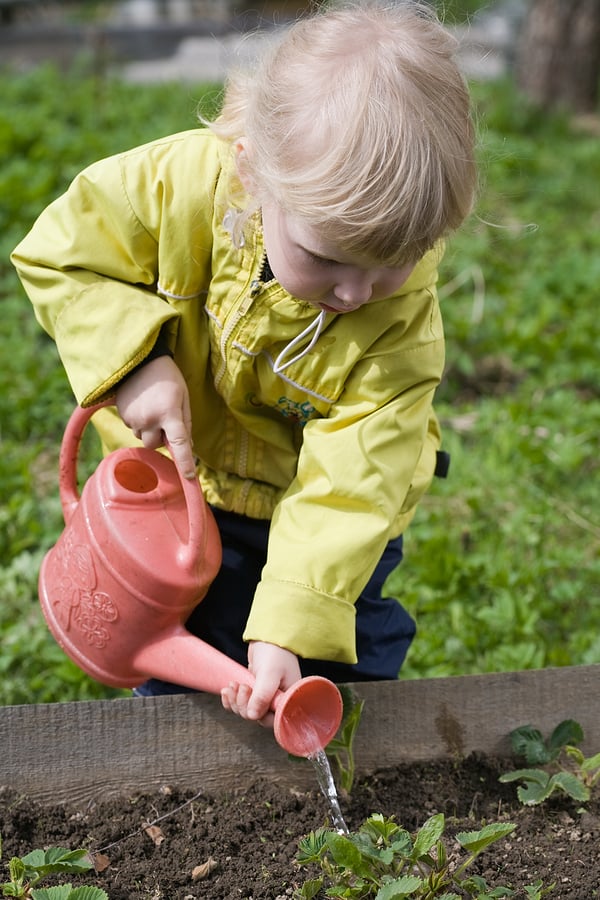
All you need is a basic gardening set and you’re set to go.
5. Skittles
Purchase a set of bowling pins or make your own by filling large plastic bottles with some water and painting them in various colours. Then, place them in a row and take turns rolling a ball to knock them over.
As your child gets more skilled, make skittles with small bottles and knock them over with a smaller ball.
6. Puzzles
Puzzles are one of the best activities for children. They develop skills such as fine motor, shape recognition (pre-mathematical), problem-solving, logic, attention and of course, hand-eye coordination.
Read about why puzzles are crucial for development.
7. Balloon Toss
Blow up a small or large balloon and see how long your child can keep it in the air by hitting it.
This balloon game is excellent for developing coordination as it requires moving and thinking fast to prevent the balloon from dropping, and working the eyes and hands simultaneously.
8. Sandpit Toys
Playing in the sandpit by filling containers with sand and building sand structures can provide much practice for developing coordination.
Offer your children buckets and containers of different sizes, as well as utensils such as shovels and rakes.
9. Cutting and Sticking
Give kids different types of paper – such as newspaper, tissue paper, cardboard, etc. – and let them cut it into shapes or strips.
Learning to cut with scissors is a great way to build hand-eye coordination at a young age.
Provide glue such as liquid wood glue, craft glue, a glue stick or even a mixture of flour and water with some paintbrushes to spread the glue.
10. Skipping Rope
Skipping is a challenging skill that many children struggle to do, yet is so good for a child’s coordination.
Not only do children have to coordinate both sides of their body and alternate legs, but they also need to move the skipping rope while making sure to watch that they jump through the rope.
11. Bean Bag Toss
Bean bags are a must-have in every household and school. Playing with bean bags develops gross and fine motor skills.
You can build your kids’ hand-eye coordination in various ways:
- Toss them into a washing basket
- Throw them into a low hula hoop
- Catch them with one hand (from 5 years of age)
- Throw them in the air and catch them (from 6 years of age)
- Play a bean bag toss game
12. Drawing
Your children should be spending time drawing every day. This basic activity improves how the eyes and fingers work together to achieve a task.
Provide different utensils and mediums – such as paper, cardboard, a whiteboard, pencils, wax crayons, paint, etc.
13. Blackboard and Chalk
A large chalkboard gives children the opportunity to draw while working their large muscles. They also have to cross their arms over to reach the left and right of the board, which develops their ability to cross the midline.
14. Dribbling a Ball Around Cones
Place plastic cones in a shape such as a straight line or circle and dribble a ball in between them using a cricket or baseball bat.
Improvise by using plastic bottles filled with water.
15. Finger Painting
This messy activity provides a sensory experience as well as an opportunity to build eye-hand coordination.
Make your own finger paint at home or buy ready-made paint.
For even more fun, try using bath finger paint. Your children will love learning while getting their hands in the paint.
16. Building with Blocks or Lego
Building toys, such as wooden blocks or Lego, are great for developing attention span, fine motor skills and coordination.
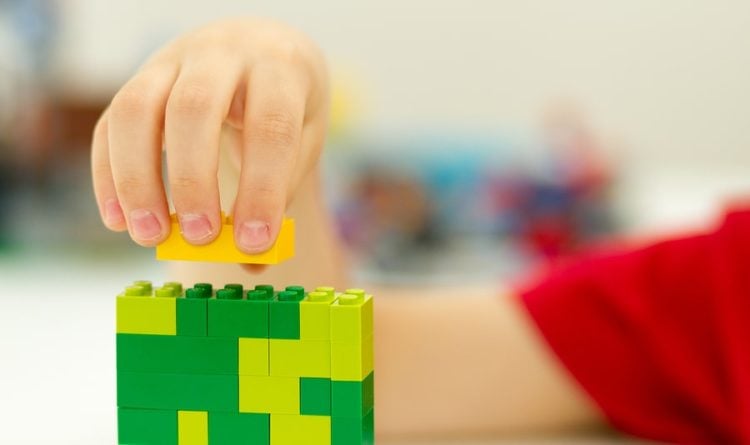
Having a set of wooden blocks is an essential educational toy for every child and one that will provide hours of learning as children build creativity, imagination, problem-solving skills, and much more.
Instead of buying small, flimsy blocks, invest in a proper set of good-quality wooden blocks.
Here are some more examples of great fine motor skills toys that you probably already have at home.
17. Construction Toys
As an alternative to blocks and Lego, offer your child other construction toys that have pieces that link, join or click and fit into each other.
18. Egg and Spoon Race
The egg and spoon race is one of my favourites. This is such a simple game to play with your children and you’ll be laughing and giggling together as they practise this important skill.
It’s a great balancing activity for young kids.
Don’t forget to boil the egg first!
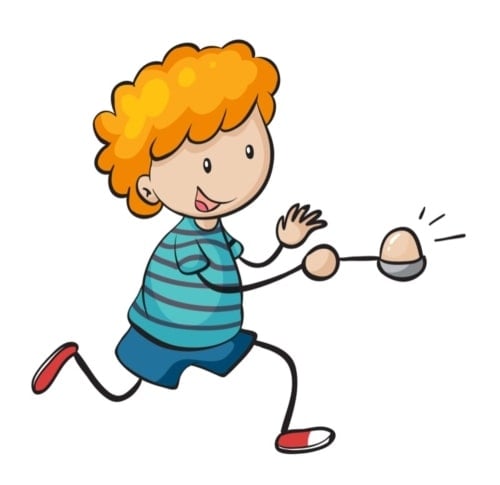
19. Swing Ball
Hitting a ball on a rope with a bat is one of the best activities for developing hand-eye coordination. You can build one at home with a wooden pole and a rope.
Sometimes, children have problems with poor eye-hand coordination – related to vision or motor control.
In her book “Total Learning: Developmental Curriculum for the Young Child“, Joanne Hendrick says to look out for the following signs:
- Clumsiness
- Frustration
- Holding things too close to their eyes
- Avoiding activities
She suggests speaking to a paediatrician, ophthalmologist or optometrist if you suspect a child has difficulties with hand-eye coordination.
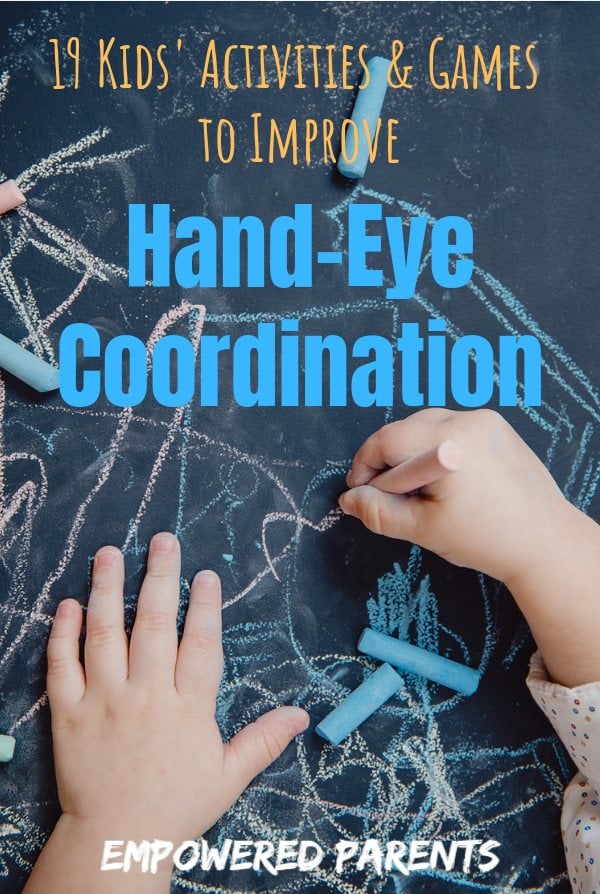
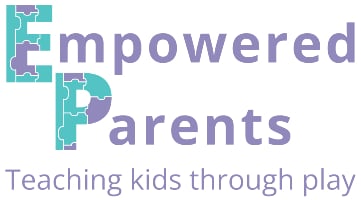
hamid
Tuesday 9th of July 2024
very good
Tanja McIlroy
Tuesday 9th of July 2024
Thanks for reading, Hamid!
Lebohang
Saturday 3rd of July 2021
I find suggested activities very useful. I really appreciate
Tanja Mcilroy
Tuesday 6th of July 2021
Thanks, Lebohang. I'm glad you like these!
Mereoni
Wednesday 5th of August 2020
Àwesome activities. For children. They really enjoy it
Tanja Mcilroy
Wednesday 5th of August 2020
I'm glad you like these activities Mereoni!
Shilpa
Monday 25th of May 2020
Superb activities 👌👌
Tanja Mcilroy
Monday 25th of May 2020
Thanks Shilpa!
Bindu K Nair
Wednesday 20th of May 2020
Fantastic activities! Can't thank you enough.
Tanja Mcilroy
Friday 22nd of May 2020
You're most welcome Bindu!